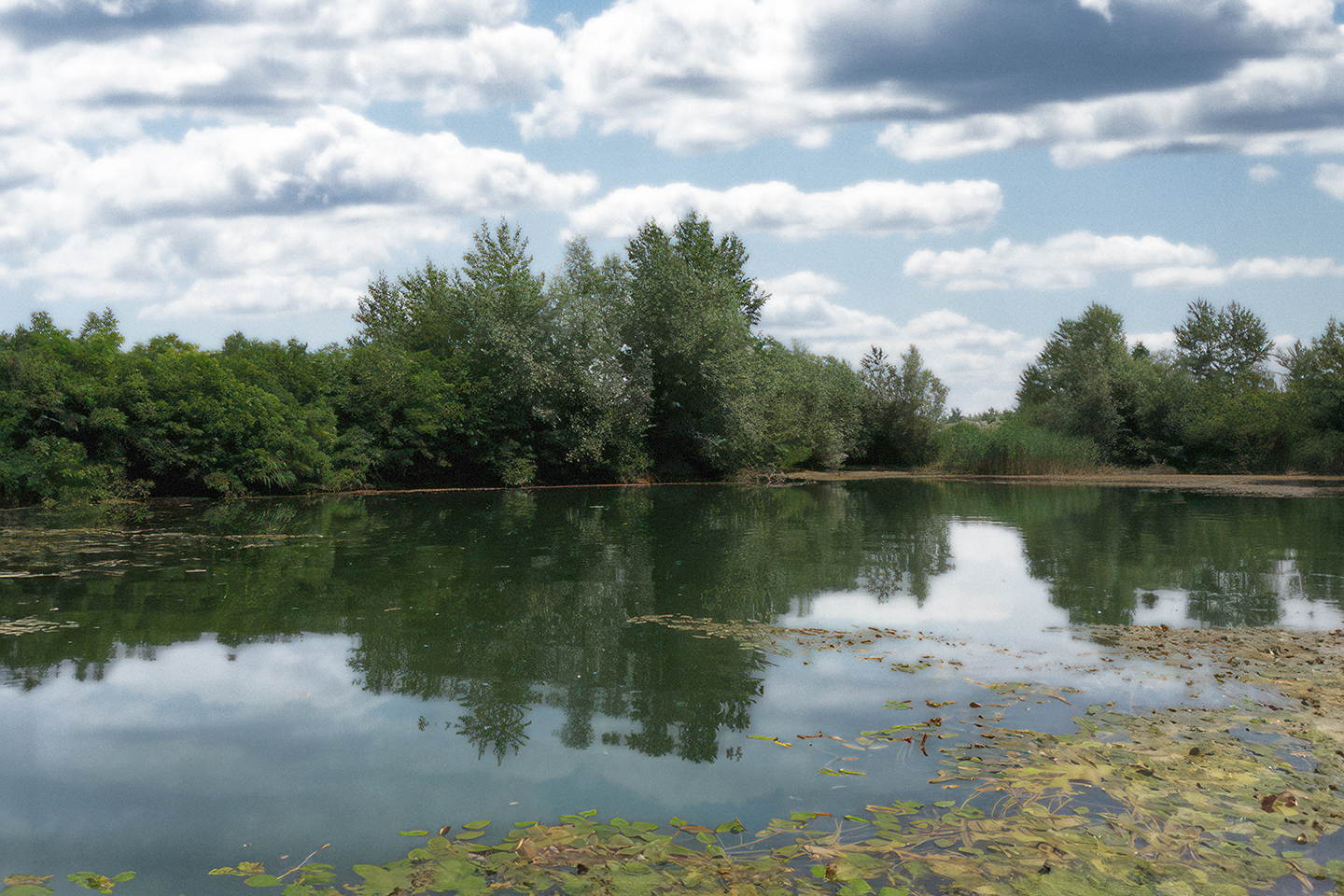Selling the Lakes
Fort Worth Star-Telegram Real Estate Quarterly, September 25, 2000

Timing may finally be right to awaken Arlington's long-dormant premier property
By STEVE McLINDEN
ARLINGTON - Head-high weeds, broken only by a series of craggy dirt paths and unattended man-made lakes, are the sole signs of life on a massive north Arlington tract where an army of earthmovers once traversed.
Once a seven-day-a-week digging operation described by its former property owner "as the largest dirt project in America," the 2,000-acre parcel on Farm Road 157 - the premier undeveloped commercial tract in the city - remains an unfulfilled tax-revenue dream for city officials and a source of frustration for would-be developers.
Sitting fallow for more than 14 months since owner Golf Communities of America filed for Chapter 11 bankruptcy in July 1999, the former flood plain land continues to languish.
But a major break in the nearly decade-long development saga of the property, once known as Metrovest, may have occurred in a Florida courtroom this month.
On Sept. 1, a bankruptcy judge awarded the acreage to Credit Suisse First Boston, the main creditor to Golf Communities projects nationwide.
Credit Swisse First Boston, a subsidiary of the Swiss bank Credit Suisse, abruptly cut off funding last year to the Lakes of Arlington golf/residential complex and other residential and resort projects, prompting a protracted series of often contentious bankruptcy hearings that ended in the dissolution of Golf Communities of America.
Credit Suisse said it will seek a buyer for the property and three other golf courses previously owned by Orlando, Fla.-based Golf Communities.
How vigorously the financial institution will market the stagnant Lakes property, which is south of an industrial area in Euless and close to an Arlington city landfill remaians unknown. More important, perhaps, is the question of how the land will developed.
Unlike Golf Communities and the man who sold it the land, city officials and developers don't consider the acreage conducive to single-family residential development.
Before work stopped on the sprawling project, the Lakes had been marketed as an eventual home to more than 900 lots in three gated communities, including a 38-acre island subdivision on a man-made lake. An 18-hole golf course and up to 3 million square feet of retail and high-rise office towers, plus at least one hotel, were expected to dot the landscape, along with other lakes and channels on 125 acres of ecological land and greenbelt, plus walking and biking paths.
Previous owner Jim Salim, who had minimal development experience, acquired the land in 1992 out of receivership for an estimated $3.5 million. Over the years, Salim vacillated on plans for the property before finally selling it to Golf Communities in 1998.
Salim first indicated that he would build a multimillion dollar entertainment complex, named either Arlington Gardens or Metro World, on the plot, but soon modified the plan to a more standard mixed-use of commercial and residential development. Salim later amended the plan to include more high-dollar development and exclude light industrial uses.
Before selling the land to Golf Communities, he changed the mix again to include a broader price range of homes. He estimated that he poured $25 million into ground work at the project, originally known as Metrovest, before selling it for what he said was $51 million in cash and stock.
When Golf Communities was dissolved in the bankruptcy, Salim, who with more than 10 million shares was the second-largest shareholder in the firm behind Credit Suisse, estimates that he lost $14 million on the project.
While development may not quite be back to square one, it may have come full circle in a planning sense.
Meridian Savings and Loan first assembled the land in 1984 with plans to market it as an industrial business park similar to the Centreport complex near Dallas/Fort Worth Airport. Meridian spent parts of three years working with the U.S. Army Corps of Engineers on plans for a $50 million levee system to protect 1,200 acres of the piece from flooding.
But in 1988, about the time plans were finalized for the levee, Meridian faced severe financial problems and eventually failed.
The acreage, bounded by four major thoroughfares and sitting in the heart of the Metroplex just 10 minutes south of D/FW Airport, remains the largest single parcel of developable land available to Arlington.
Unfulfilled Commitment
After Salim took over the property in 1992, he spent hundreds of hours personally digging lakes and clearing portions of the property to get a head start on flood-control requirements for the land.
Central to Salim's plans was persuading city and state officials to make multimillion-dollar improvements to Farm Road 157 (Collins Street), one of the few major north-south roads through Arlington.
Eventually, Salim persuaded the city to annex the land in 1997, in part by donating 217 acres for use by River Legacy Park and 158 acres for additional parks, in what was the largest parkland contribution ever made to Arlington.
Finally, the Texas Transportation Commission voted in 1998 to release $12.7 million by 2001 to widen the 3.1-mile span of Farm Road 157 next to the Lakes development and move it 600 feet east. The city consented to kick in $2 million to the widening project, which is expected to transform the route into a major north-south portal into Arlingion.
An economic impact analysis commissioned by the city estimated that the Lakes of Arlington would contribute an average of more than $500 million to the area's economy during each of the 24 years it would take Metrovest Partners to build the huge multi-use project. The project could eventually create more than 7,000 jobs at the site, the analysis said.
But the bubble burst less than a year after Golf Communities bought the land. The company filed bankruptcy on July 13, 1999, and ground work stopped almost immediately.
"It was tough to take," Salim says. "It's a shame for everyone. It wasn't just the money and the time and the effort, it was the unfulfilled commitment to community that's also painful. They should have had a nice a quality-of-life center there by now."
When he sold the company to Golf Communities, "it was clearly a projected $10-per-share-stock," Salim says.
"But the only people that made out on this was Credit Suisse," he says. "We easily stood to make $75 million if they had fulfilled their promises [for $500 million in development funding]. But they acted like hardened white-collar criminals."
Oscar Cantu, a lawyer with Weil, Gotshal and Manges who represented Credit Suisse, says Golf Communities "was clearly in default when they requested additional funding" in 1999.
Credit Suisse is still evaluating the property and has not decided how it will be marketed or if it will be packaged as part of a larger portfolio, Cantu says.
Under the reorganization, Credit Suisse also secured the Plantation Golf Club in Pinehurst, N.C.; Red Hawk golf community in St. George, Utah; and Cutter Sound in Palm City, Fla. Unsecured creditors will get proceeds from the sale of the remaining properties, including Hillcrest Country Club in Monteverde, Fla; Wedgefield Golf & Country Club in Orlando; the Pines in Orange City, Fla; and the Cotton Acres and Cotton Manor residential developments in St. George.
Developers show interest in the Arlington project.
"I have been pursuing that property diligently," says developer Ralph Shelton, president of DalMac-Shelton Associates and former Arlington economic development director. "But I don't see single-family there because of the dump ground."
A Chronology...
1842: Area's first Anglo settlers abandon the property as a fort site.
1842 - 1983: Area's first Anglo settlers abandon the property as a fort site.
1984: Meridian Savings and Loan assembles the land with eventual plans to market it as an industrial business park similar to the Centreport complex near Dallas/Fort Worth Airport. It works with the U. S. Army Corps of Engineers on plans for a $50 million levee system to protect 1,200 acres from flooding.
1988: Experiencing severe financial problems, Meridian fails.
1992: Jim Salim acquires the property out of receivership for an estimated $3.5 million and begins limited flood plain mitigation work.
1994: Salim announces plans to build a multimillion-dollar entertainment complex, named either Arlington Gardens or MetroWorld. He begins work on a 350-acre lake.
1996: Salim announces new plans for high-dollar homes, minimum $500,000, in gated communities on the acreage.
1997: Salim amends plans to add a range of homes of varying prices, plus 3 million square feet of retail and office space. Arlington annexes the property.
1998: Salim sells the land for an estimated $51 million in cash and stock to Orlando, Fla.-based Gold Communities of America. GCA announces plans for an 18-hole golf course, more than 900 lots in three gated communities—including a 38-acre island subdivision on a man-made lake—and up to 3 million square feet of retail and high-rise office towers and at least one hotel.
1999: GCA files Chapter 11 on July 13, saying that its main creditor, Credit Suisse First Boston, cut off funding to all of its projects around the country. Work on the Lakes of Arlington stops.
2000: A bankruptcy judge awards the Lakes to Credit Suisse First Boston on Sept. 1. GCA is dissolved, rendering Salim's stock worthless. Credit Suisse says it will market the property to a new owner.

